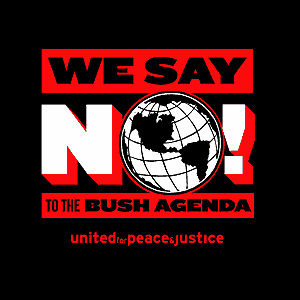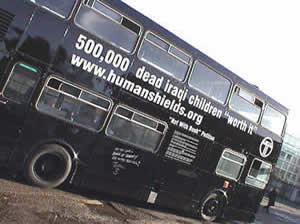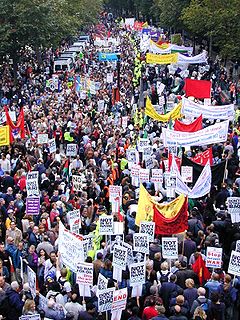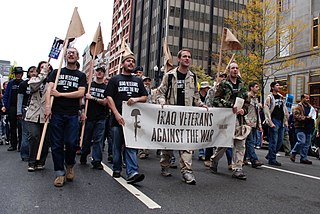
This article describes the positions of world governments before the actual initiation of the 2003 invasion of Iraq, and not their current positions as they may have changed since then.

Significant opposition to the Iraq War occurred worldwide, both before and during the initial 2003 invasion of Iraq by a United States-led coalition, and throughout the subsequent occupation. People and groups opposing the war include the governments of many nations which did not take part in the invasion, and significant sections of the populace in those that did.

Beginning in late 2002, and continuing after the 2003 invasion of Iraq, large-scale protests against the Iraq War were held in many cities worldwide, often coordinated to occur simultaneously around the world. After the biggest series of demonstrations, on February 15, 2003, New York Times writer Patrick Tyler claimed that they showed that there were two superpowers on the planet: the United States and worldwide public opinion.
The War Resisters League (WRL) is the oldest secular pacifist organization in the United States.

Act Now to Stop War and End Racism (ANSWER), also known as International A.N.S.W.E.R. and the ANSWER Coalition, is a United States–based protest umbrella group consisting of many antiwar and civil rights organizations. Formed in the wake of the September 11th attacks, ANSWER has since helped to organize many of the largest anti-war demonstrations in the United States, including demonstrations of hundreds of thousands against the Iraq War. The group has also organized activities around a variety of other issues, ranging from the Israel/Palestine debate to immigrant rights to Social Security to the extradition of Luis Posada Carriles.
Peace Action is a peace organization whose focus is on preventing the deployment of nuclear weapons in space, thwarting weapons sales to countries with human rights violations, and promoting a new United States foreign policy based on common security and peaceful resolution to international conflicts.

Medea Benjamin is an American political activist who was the co-founder of Code Pink with Jodie Evans and others. Along with activist and author Kevin Danaher, she created the fair trade advocacy group Global Exchange. Benjamin was the Green Party candidate in California in 2000 for the United States Senate, receiving the highest raw vote total of any Green Party U.S. Senate candidate. She has contributed to OpEdNews and The Huffington Post.

United for Peace and Justice (UFPJ) is a coalition of more than 1,300 international and U.S.-based organizations opposed to "our government's policy of permanent warfare and empire-building."
The post–September 11 anti-war movement is an anti-war social movement that emerged after the September 11 terrorist attacks in response to the war on terror.

The Human Shield Action to Iraq was a group of people who traveled to Iraq to act as human shields with the aim of preventing the U.S.-led coalition forces from bombing certain locations during the 2003 invasion of Iraq.
Gold Star Families for Peace (GSFP) is a United States-based organization founded in January 2005 by individuals who lost family members in the Iraq War, and are thus entitled to display a Gold Star. It is considered an offshoot of Military Families Speak Out. Gold Star Families for Peace now includes more than 65 families of troops killed in Iraq.

Veterans for Peace is an organization founded in 1985. Initially made up of US military veterans of World War II, the Korean War, the Vietnam War, the Gulf War, the War in Afghanistan and the Iraq War, and as well as peacetime veterans and non-veterans, it has since spread overseas and has an active offshoot in the United Kingdom. The group works to promote alternatives to war.

On 15 February 2003, a coordinated day of protests was held across the world in which people in more than 600 cities expressed opposition to the imminent Iraq War. It was part of a series of protests and political events that had begun in 2002 and continued as the invasion, war, and occupation took place. The day was described by social movement researchers as "the largest protest event in human history".
On September 24, 2005, many protests against the 2003 invasion of Iraq and the Iraq War took place.

The proposed invasion of Afghanistan prompted protests with mass demonstrations in the days leading up to the official launch of the war on October 7, 2001. The continuation of the war in Afghanistan from 2001 to 2021 lead to further protest and opposition to hostilities.
Campus Antiwar Network (CAN) is an American independent grassroots network of students opposing the occupation of Iraq and military recruiters in US schools. It was founded prior to the 2003 invasion of Iraq, and claims to be the largest campus-based antiwar organization in the United States.

Iraq Veterans Against the War (IVAW) is an advocacy group of formerly active-duty United States military personnel, Iraq War veterans, Afghanistan War veterans, and other veterans who have served since the September 11, 2001 attacks; who were opposed to the U.S. military invasion and occupation in Iraq from 2003 to 2011. The organization advocated the immediate withdrawal of all coalition forces in Iraq, and reparations paid to the Iraqi people. It also provides support services for returning veterans to include health care and mental health.

Student Peace Action Network or SPAN is the student wing of Peace Action. [1] It is also a coordinating committee member of the National Youth and Student Peace Coalition (NYSPC). [2] SPAN works to end U.S. militarism, nuclear weapons, weapons trafficking, and “the complex webs of corporate and military power that perpetuate racism, damage the environment, deprive people of basic needs, and violate human rights.” [3]It currently has over 130 chapters and affiliates.

A peace movement is a social movement which seeks to achieve ideals, such as the ending of a particular war or minimizing inter-human violence in a particular place or situation. They are often linked to the goal of achieving world peace. Some of the methods used to achieve these goals include advocacy of pacifism, nonviolent resistance, diplomacy, boycotts, peace camps, ethical consumerism, supporting anti-war political candidates, supporting legislation to remove profits from government contracts to the military–industrial complex, banning guns, creating tools for open government and transparency, direct democracy, supporting whistleblowers who expose war crimes or conspiracies to create wars, demonstrations, and political lobbying. The political cooperative is an example of an organization which seeks to merge all peace-movement and green organizations; they may have diverse goals, but have the common ideal of peace and humane sustainability. A concern of some peace activists is the challenge of attaining peace when those against peace often use violence as their means of communication and empowerment.

March 19, 2008, being the fifth anniversary of the United States 2003 invasion of Iraq and in protest and demonstration in opposition to the war in Iraq, anti-war protests were held throughout the world including a series of autonomous actions in the United States' capitol, Washington, D.C., in London, Sydney, Australia, and the Scottish city of Glasgow with the latter three being organized by the UK-based Stop the War Coalition. Actions included demonstrations at government buildings and landmarks, protests at military installations and student-led street blockades. The protests were notable, in part, for mostly replacing mass marches with civil disobedience – including religious-focused protests – and for utilizing new technologies to both coordinate actions and interface with traditional print and broadcast media.














